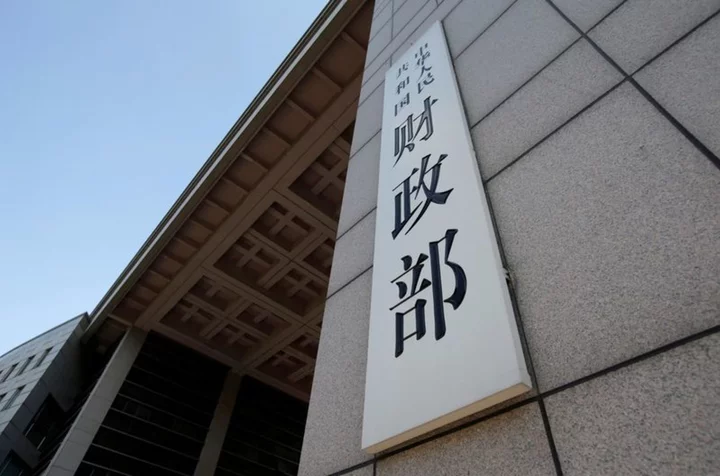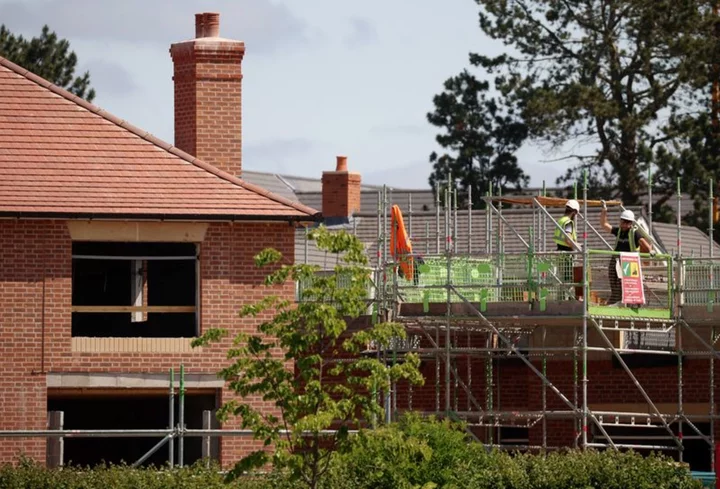BEIJING (Reuters) -China will let local governments raise about 1 trillion yuan ($140 billion) through bond sales to repay the debt of local-government financing vehicles (LGFVs) and other off-balance-sheet issuers, Bloomberg News reported on Friday.
Debt-laden municipalities represent a major risk to China's economy and financial stability, economists say, after years of over-investment in infrastructure, plummeting returns from land sales and soaring COVID-19 costs.
The International Monetary Fund estimates 66 trillion yuan ($9.1 trillion) in total debt is held by LGFVs, which cities use to raise money for infrastructure projects critical to the country's development.
The finance ministry has informed relevant authorities about the "refinancing bonds" programme, Bloomberg said, citing unnamed people with knowledge of the matter. Quotas have been set for each region, it added.
The ministry did not immediately respond to a request for comment.
Chinese leaders last month pledged to unveil a "basket of measures" to tackle local debt risks, without announcing details, signalling worries that a potential chain of municipal debt defaults could destabilise the financial sector and put more pressure on the sputtering economy.
Policy advisers and economists have said measures are likely to include debt swaps, loan rollovers and possible debt issuance by the central government to bail out some localities.
The reported new step would be small - 1 trillion yuan is just 1.5% of the estimated total LGFV debt.
LGFVs play a key role in infrastructure projects, which are a major growth driver for the world's second-largest economy. But some analysts say they have become the "black holes" of the country's financial system, with surging debt loads and weak revenues beginning to alarm investors.
"This step will help tackle local debt risks and more measures will be rolled out," said Nie Wen, a Shanghai-based economist at investment firm Hwabao Trust.
"Authorities hope to gradually resolve the debt issue with a basket of measures, which could take some time."
The move, which mirrors an earlier scheme, will allow local governments to issue bonds at an interest rate of around 3%, to replace expensive LGFV debt. Some cities and LGFVs pay 7-10% interest.
From 2015 to 2018, local governments issued some 12 trillion yuan of bonds to swap for off-balance sheet debt, but liabilities have continued to climb.
Local government debt rose to 92 trillion yuan, or 76% of economic output, last year from 62.2% in 2019.
No LGFV in China has defaulted in the public markets, but delinquencies in the private market are increasing. Big state-owned banks have recently rolled over loans to LGFVs or lent more to them.
Typically, Chinese banks are the largest buyers of local government bonds and they also issue the largest amount of loans to local entities.
"We believe that commercial banks rather than the central government will bear most of the costs of local government debt restructuring," analysts at ANZ said in a note in late June, adding they did not expect a large number of defaults in the near term.
The finances of LGFVs have deteriorated alongside a severe slump in China's property sector, which has caused a growing number of developers to default on their debts. Municipalities' main source of revenues - land auctions to developers - fell off a cliff at the same time their spending needs rose sharply to cope with pandemic spending.
All provincial-level governments but Beijing, Shanghai, Guangdong and Tibet will be able to use the bonds to repay off-balance-sheet liabilities, or "hidden debt", according to Bloomberg.
Authorities also identified "high-risk" provinces and cities - including Guizhou, Hunan, Jilin and Anhui provinces and Tianjin city -where more support will be provided - the report said.
Economists say last month's pledge on debt cleanup was more constructive than the message in April, when Communist Party leaders led by President Xi Jinping demanded "strict control" of local debts.
The change suggests Beijing has realised it needs to urgently throw cash at the problem, economists say.
($1 = 7.2280 Chinese yuan renminbi)
(Reporting by Kevin Yao in Beijing and Nilutpal Timsina in Bengaluru; Editing by William Mallard and Kim Coghill)









